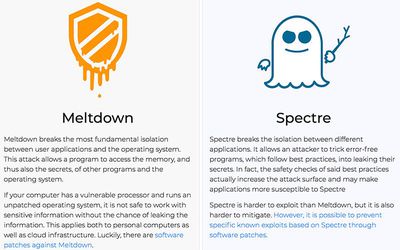Back in January 2018, a class action lawsuit was filed against Apple for the Meltdown and Spectre vulnerabilities that affected a wide range of processors from Intel and ARM, including those used in Apple's Macs and iOS devices.
Meltdown and Spectre were hardware-based vulnerabilities designed to take advantage of the speculative execution mechanism of a CPU, allowing hackers to gain access to sensitive information.

Apple quickly mitigated Spectre and Meltdown with software patches, but a class action complaint was filed against Apple alleging that Apple knew about the design defects in June 2017 and did not more promptly inform the public.
The complaint also suggested that Apple would not be able to adequately patch Meltdown and Spectre without slowing the performance of its processors by between five and 30 percent, a claim that turned out to be untrue.
As pointed out by AppleInsider, the class action lawsuit against Apple was today dismissed for "lack of standing and failure to state a claim."
According to the ruling, the plaintiffs in the case were not able to allege injury because none of their devices were accessed via Spectre or Meltdown and no degradation in performance was personally experienced by the plaintiffs.
Furthermore, the court said that even if some devices were affected by Meltdown and Spectre as evidenced in some of the benchmarks submitted by the plaintiffs, it does not suggest that all users experienced slower performance, nor were the plaintiffs able to prove that their iOS devices diminished in value.
Given these reasons, Apple's motion to dismiss was granted, though the plaintiffs in the lawsuit are able to provide an amended complaint by January 24, 2019.






















Top Rated Comments
This case was filed about a year ago, during which time it sat with pretty much no meaningful action other than being consolidated with other cases. Then Apple filed a motion to dismiss, plaintiffs responded, an oral hearing was held that lasted 1 hour and 14 minutes, and the Judge issued an 9-page mostly-boilerplate older dismissing the case.
All in, this case probably used 1.5 hours of Judge time and 3 hours of clerk time. It was efficiently handled. This is an example showing that the system works. (of course there are examples of where it doesn't, but this isn't it at all, not even close).
If Apple wants, they can be the ones to further burden the courts time by seeking costs, but I doubt they will. I bet Apple's legal fees for this one motion were ~$10k, only because they probably hired a big expensive firm that threw a few associates at problem. The same outcome could have been achieved from a small firm for under $5k. It's not worth their time to seek costs.